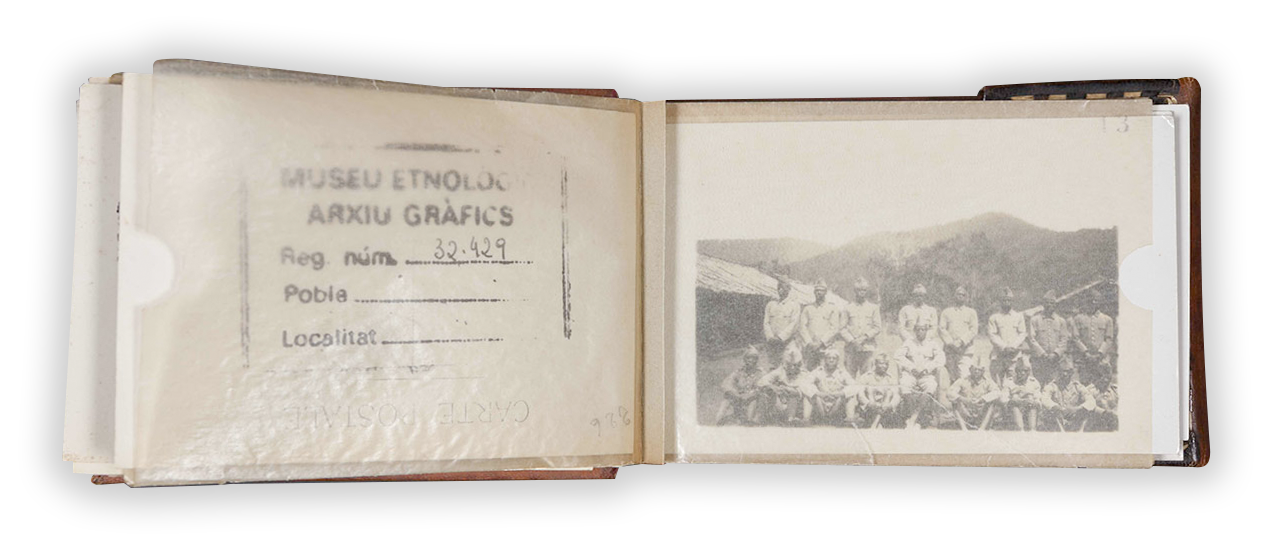THE PROGRAM
(Tr)african(t)s. Museums and Collections of Catalonia in the Face of Coloniality

The programme seeks to generate an academic and social debate on the so-called ‘politics of reparation’ and on the right of people belonging to diasporic communities, and communities of origin, to maintain, control, protect, develop and enjoy their cultural heritage, illegitimately held in European public museums
Share
(Tr)african(t)s aims to trace the origins and conditions of acquisition of the pieces and collections from the Spanish colonial empire in Morocco, Equatorial Guinea and the Philippines that are now kept in the network of public museums in Catalonia, and to facilitate processes of reformulation, reinterpretation, and reparation within these institutions.
The purpose is to encourage collective reflection among Catalan and global citizens on the rights of individuals to enjoy their own culture. This will be approached from a gender and intersectional perspective and by strengthening the link with the diasporic communities of the countries where this heritage was acquired.
Starting from provenance research on the origin of collections, we will make visible extractivist, often compulsive, dynamics that European museums have hidden until very recently. Due to political and symbolic pressure from diasporic communities and countries of origin, museum institutions are nowadays forced to reconsider not only the processes of acquisition and accumulation in the past, but also those of conservation, exhibition, and identification in the present.
The programme seeks to generate an academic and social debate on the so-called ‘politics of reparation’ and on the right of people belonging to diasporic communities, and communities of origin, to maintain, control, protect, develop and enjoy their cultural heritage, illegitimately held in European public museums.
The research must also serve as a starting point to promote debates that question the working methodologies themselves and go beyond the usual boundaries of the academic world. For this reason, the project will develop, based on the research, multiple communication, dissemination and knowledge transfer activities, such as public programmes, a documentary film, an exhibition, and a monograph.
Promoting entities
The UB Solidarity Foundation (FSUB) is a key player in the promotion of democratic values, social justice and sustainability, both locally and internationally. Its mission is to use the university’s human, scientific and technical resources to improve the situation of the most vulnerable social sectors and to contribute to the progress of society in general.
In the field of education, the FSUB works with hundreds of teachers and secondary school students throughout the province of Barcelona. It is also worth highlighting its work in social inclusion and the welcoming of refugees, through agreements with specialized organizations and the participation in projects to raise awareness of the causes of forced displacement.
In terms of sustainable development, the FSUB participates in international cooperation projects and collaborates in initiatives such as EdiCitNet – Edible Cities Network, where it works with the Catalan Water Research Institute (ICRA).
On democratic memory, the FSUB leads the European Observatory on Memories (EUROM), a transnational network that analyses and promotes public memory policies. Through the European Commission’s Europe for Citizens programme, EUROM addresses issues such as the consequences of Nazism, Fascism and Stalinism, the Spanish Civil War, and other processes of democratic transition in Europe and Latin America.
The Research Group on Social Exclusion and Control (GRECS) is a large team of researchers based in the University of Barcelona. It is dedicated to the study of exclusionary practices, understanding that ideologies of exclusion act as a source that legitimizes the violation of rights and the drastic limitation of opportunities for members of certain groups. Taking into account the current circumstances in Catalonia and paying attention to intersectional dynamics, GRECS is particularly interested in analysing and denouncing the processes of exclusion experienced by communities associated with so-called ‘extra-community immigration’, as well as the practices of bodily representation that tend to pathologize non-hegemonic forms of gender and sexuality construction.
In order to implement exclusion and social control, it is necessary to have a system of representation based on clichés, stereotypes, and prejudices to justify the inferiorization of the victim. This ideological environment is an ironic consequence of the apparent democratic heyday, as it intensifies and generalizes the devices of exclusion in our society. The GRECS tackles this issue through projects that examine the growing criminalization of immigrants, despite the fact that they are fundamental actors in a globalized world. Even so, the institutional treatment of migrations continues to be state-based, often denying migrants their recognition as political and social subjects. With the aim of developing these concerns, the group proposes contributions from anthropology, pedagogy, sociology, and the sociology of law to understand identity dynamics and social relations.
Collaborating entity
The Observatory of Everyday Life (OVQ) is an independent, interdisciplinary organization that has been working since 2003 for international cooperation for development and social transformation, through the implementation of socio-cultural research projects, visual arts, dissemination, and community action. These efforts are always carried out with inclusive methodologies, which promote transversalism, awareness and political advocacy, teamwork, and dynamic collaboration with other people, entities and institutions, both locally and internationally.
OVQ develops cultural and educational projects based on historical and ethnographic participatory research that are formalized in books, documentaries, exhibitions, websites, pedagogical projects and mediation programmes / community engagement. In recent years, the organization’s work has revolved around five lines of intervention: (1) Solidarity and international cooperation; (2) Neighbourhood memory in Barcelona’s working-class neighbourhoods; (3) Denouncing the Catalan and Spanish colonial past; (4) Contemporary migrations; and (5) Citizen struggles for social transformation.
OVQ also collaborates actively with GRECS of the University of Barcelona, with the UB Solidarity Foundation (FSUB) and with various international projects, such as the SIT’s Cities in the 21st Century university programme, the Goethe-Institut’s decolonial network Latitude and the Laboratorio di Sociologia Visuale in Genoa.
